
Pretzel Logic is the third studio album by American rock band Steely Dan, released by ABC Records on February 20, 1974. It was recorded at the Village Recorder in West Los Angeles, California, with producer Gary Katz. The album was Steely Dan's last to be made and released while the group was still an active touring band, as well as the final album to feature the band's full quintet-lineup of Becker, Fagen, Denny Dias, Jim Hodder, and Jeff "Skunk" Baxter, though it also features significant contributions from many prominent Los Angeles-based studio musicians.

Robert Thomas Christgau is an American music journalist and essayist. He began his career in the late 1960s as one of the earliest professional rock critics and later became an early proponent of musical movements such as hip hop, riot grrrl, and the import of African popular music in the West. Christgau spent 37 years as the chief music critic and senior editor for The Village Voice, during which time he created and oversaw the annual Pazz & Jop critics poll. He has also covered popular music for Esquire, Creem, Newsday, Playboy, Rolling Stone, Billboard, NPR, Blender, and MSN Music, and was a visiting arts teacher at New York University. CNN senior writer Jamie Allen has called Christgau "the E. F. Hutton of the music world – when he talks, people listen."
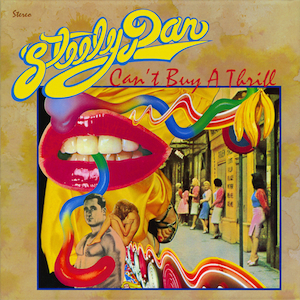
Can't Buy a Thrill is the debut studio album by American rock band Steely Dan, released by ABC Records in November 1972. It was written by band members Walter Becker and Donald Fagen, and recorded in August 1972 at the Village Recorder in West Los Angeles, California, with producer Gary Katz. The album is one of Steely Dan's most stylistically eclectic, encompassing the sounds of soft rock, folk rock, jazz-rock and pop, alongside philosophical, elliptical lyrics.
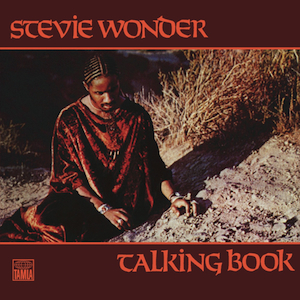
Talking Book is the fifteenth studio album by American singer, songwriter, and musician Stevie Wonder, released on October 27, 1972, by Tamla, a subsidiary of Motown Records. This album and Music of My Mind, released earlier the same year, are generally considered to mark the start of Wonder's "classic period". The sound of the album is sharply defined by Wonder's use of keyboards and synthesizers.

Pork Soda is the third studio album by the American rock band Primus. It was released on April 20, 1993, by Interscope Records and Prawn Song Records. The album was certified gold in September 1993 and platinum in May 1997. The 2005 re-issue comes in a digipak and contains a booklet with lyrics printed to nine songs, omitting "Pork Soda" which consists of a series of unintelligible rants.

Tom Petty and the Heartbreakers is the debut album by the band of the same name, released on November 9, 1976, by Shelter Records. The album was recorded and mixed at the Shelter Studio in Hollywood, California.

The Rolling Stones, Now! is the third American studio album by English rock band the Rolling Stones, released on 13 February 1965 by their initial American distributor, London Records. Although it contains two previously unissued songs and an alternative version, the album mostly consists of songs released earlier in the United Kingdom, plus the group's recent single in the United States, "Heart of Stone" backed with "What a Shame". Mick Jagger and Keith Richards wrote four of the songs on the album, with the balance composed by American rhythm and blues and rock and roll artists.

In the City is the debut studio album by British band the Jam. Released in May 1977 by Polydor Records, the album reached No. 20 on the UK Albums Chart.
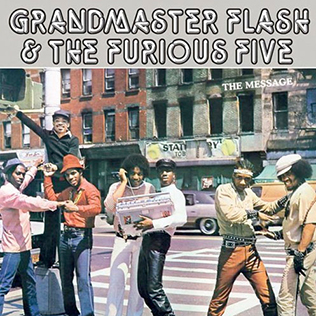
The Message is the debut studio album by American hip hop group Grandmaster Flash and the Furious Five, released on October 3, 1982 by Sugar Hill Records. It features the influential title track and hip hop single "The Message".

10cc is the debut album by the British rock band 10cc, first released in 1973. It was recorded at Strawberry Studios in Stockport, which was part-owned by guitarist and engineer Eric Stewart, and released on Jonathan King's UK Records label. The album reached number 36 in the UK Albums Chart.

Arc of a Diver is the second solo studio album by singer/multi-instrumentalist Steve Winwood. Released in 1980, Winwood played all of the instruments on the album.

Jungle Fever is a soundtrack album by American R&B singer-songwriter, producer, and multi-instrumentalist Stevie Wonder, recorded for the film Jungle Fever. It was released by the Motown label on May 28, 1991.

Historic Performances Recorded at the Monterey International Pop Festival is a live album recorded at the Monterey Pop Festival in June 1967. A split artist release, it includes some of the performances by the Jimi Hendrix Experience on side one and Otis Redding on side two. It has been supplanted by later more comprehensive releases, Live at Monterey and Captured Live at the Monterey International Pop Festival .
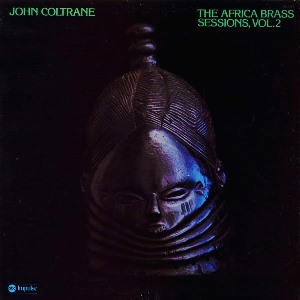
The Africa/Brass Sessions, Vol. 2 is a posthumous compilation album by American jazz saxophonist and composer John Coltrane, released in 1974 by Impulse Records. It compiles outtakes from the same 1961 sessions that produced his Africa/Brass album. "Song of the Underground Railroad" and "Greensleeves" were recorded on May 23, while "Africa" was recorded on June 4. On October 10, 1995, Impulse incorporated the tracks issued here into a two-disc set entitled The Complete Africa/Brass Sessions.

Christgau's Record Guide: Rock Albums of the Seventies is a music reference book by American music journalist and essayist Robert Christgau. It was first published in October 1981 by Ticknor & Fields. The book compiles approximately 3,000 of Christgau's capsule album reviews, most of which were originally written for his "Consumer Guide" column in The Village Voice throughout the 1970s. The entries feature annotated details about each record's release and cover a variety of genres related to rock music.
Christgau's Record Guide may refer to:
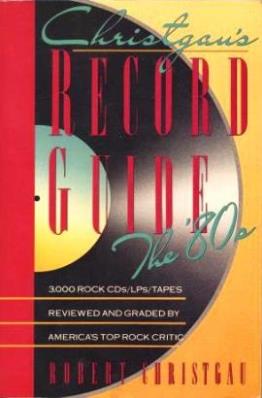
Christgau's Record Guide: The '80s is a music reference book by American music journalist and essayist Robert Christgau. It was published in October 1990 by Pantheon Books as a follow-up to Christgau's Record Guide: Rock Albums of the Seventies (1981).
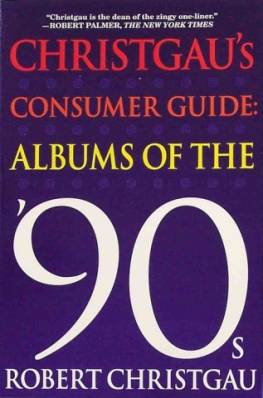
Christgau's Consumer Guide: Albums of the '90s is a music reference book by American music journalist and essayist Robert Christgau. It was published in October 2000 by St. Martin's Press's Griffin imprint and collects approximately 3,800 capsule album reviews, originally written by Christgau during the 1990s for his "Consumer Guide" column in The Village Voice. Text from his other writings for the Voice, Rolling Stone, Spin, and Playboy from this period is also featured. The book is the third in a series of influential "Consumer Guide" collections, following Christgau's Record Guide: Rock Albums of the Seventies (1981) and Christgau's Record Guide: The '80s (1990).
Tom Hull is an American music critic, web designer, and former software developer. Hull began writing criticism for The Village Voice in the mid 1970s under the mentorship of its music editor Robert Christgau, but left the field to pursue a career in software design and engineering during the 1980s and 1990s, which earned him the majority of his life's income. In the 2000s, he returned to music reviewing and wrote a jazz column for The Village Voice in the manner of Christgau's "Consumer Guide", alongside contributions to Seattle Weekly, The New Rolling Stone Album Guide, NPR Music, and the webzine Static Multimedia.

What You Hear Is What You Get – Live at Carnegie Hall is a live album by Ike & Tina Turner released on United Artists Records in 1971.
















